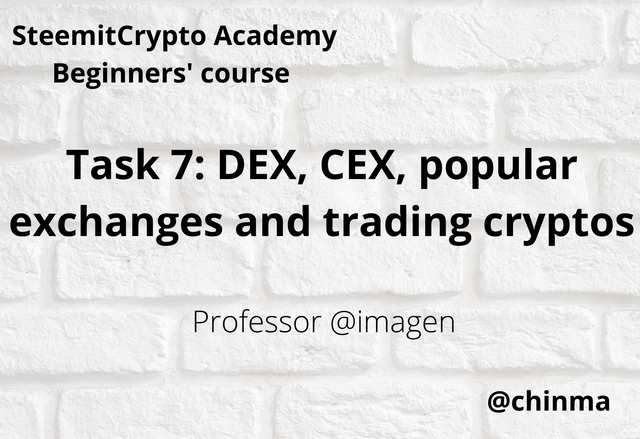Steemit Crypto Academy Season 4 Beginners' course - Homework Post for Task 7: Dex, Cex, Popular Exchanges and Trading Cryptos
1-) Choose any of the following exchanges and develop a basic guide on how to use it, indicating whether it is decentralized or centralized.
Huobi
KuCoin
Waves Dex
2-) Can cryptocurrencies and exchanges be regulated? How do regulations affect the crypto world? Name some countries with regulations.
3-) Explain in your own words what an Exchange is. Differences between a Wallet and an Exchange. Mention the advantages and disadvantages of DEX and CEX. Have you used an Exchange before? tell us about your experience.

Hi everyone. It's another week and once again, I'm excited to be taking part in this assignment given by @imagen. Let's begin;
.png)
Image from source

Regulations are in essence rules guiding an organization or group of people usually for their own best interests and to prevent wrong behavior of people in the system.
Cryptocurrencies are built based on the blockchain system, which is a decentralized system. Popular examples include Bitcoin and ethereum. Exchanges could be centralized like Binance or decentralized like Uniswap, pancake swap, and others.
My answer to this question is yes. I do believe cryptocurrencies and exchanges can be regulated.
The blockchain system used by these cryptocurrencies has been scrutinized and has evolved over the years. It is really secure as different cryptocurrencies use different consensus mechanisms to run on the blockchain network. Since the Blockchain network is decentralized, it enjoys some form of Independence and offers a lot of anonymity to users. As with all good things, malicious people have found a way to use the independence and anonymity offered by the blockchain network to get away with a lot of fraudulent activities, hence the increasing popularity of crypto scams of recent. There were cases where some exchanges themselves were found to be scams like the case of BitKRX and ICOs who offered tokens and eventually disappeared with investors' funds.
This has brought about a call for regulations in the crypto world. Crypto Exchanges can be made to go through certain regulatory procedures before the public is allowed to make use of them. There can also be regulations put in place to avoid exchanges suddenly disappearing with funds placed by traders without a trace. ICOs are also an area that can be looked into as there seems to be a lot of fraudulent activity done through this means. The Security Exchange Commission, SEC, seems to already be looking into this.

The crypto world is highly volatile and any changes greatly affect its price. When the news of China's ban on cryptocurrency hit the public, crypto-assets suffered a drop in value at that time. The main appeal of cryptocurrencies is their independence and anonymity offered and certain Regulations might seem to clamp down on the level of independence and therefore, reduce its appeal but in the long run, the crypto world would definitely bounce back, with the added advantages the regulations will bring about. ICOs now are required to meet certain requirements and go through certain procedures before presenting to the public. This way, investors have better confidence that they're not being scammed. Also, the concept of KYC regulations by exchanges is a way to ensure more transparency and therefore, know who and who are to be held responsible when certain malicious activities play out.
Gradually, one can see that in the long run, the crypto world stands to show a lot of growth and widespread acceptance with crypto regulations.

- China: China placed a ban on cryptocurrency exchanges and by May 2021, banned financial institutions therefrom engaging in crypto-related activities. ICOs are also banned as they stated a lot of reasons for making that move. This saw a lot of downward trends in cryptocurrencies during that time.
- Ecuador: In Ecuador, decentralized currencies like Bitcoin and others are banned. The country however in another twist, has stated that they would create their own State run digital currency. This currency would be backed by assets of the central bank in Ecuador.
- Algeria: In Algeria, transactions that have to do with cryptocurrencies have been banned and people caught doing so are likely to face the law.
- Japan: In Japan, certain cryptocurrencies are allowed to be traded with although it is not considered a legal tender but as assets that can be bartered with and accounted for. It is mandatory for crypto Exchanges in Japan to be registered under the Financial Services Agency of Japan and failure to do so could attract punishment legally.
- El Salvador: El Salvador recently announced in June that they would accept Bitcoin as a legal tender. This makes them the first country to do so. Salvadorans can, therefore, use Bitcoin and US dollars as their legal tender.

Although cryptocurrencies have seen increasing interest by the day, it has also become very widely used by malicious people because of the independence it enjoys. This, therefore, has brought about a need for regulations in the crypto space to allow the space to grow without too many malicious users. Coupled with the volatility of the crypto space and its ability to affect the finance of a country, many countries are still trying to figure out what to do about it. While some banned its activities as seen above, others are still on the fence while some have welcomed the idea and are willing to explore its possibilities. In all, I do believe certain crypto regulations need to be put in place to achieve more widespread acceptance and therefore, growth.